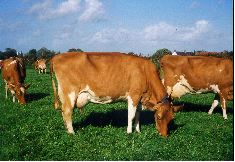|
Home
Federation
Members
Sire Summaries
Guernsey
Global
Breeding Plan
Current
Position of
the Guernsey
Breed
History of
the Breed
Useful Links
|
A product of her Island
home, the island of Guernsey situated in the English Channel
off the coast of France. The Guernsey has been developed over
many centuries to become one of the world's leading specialist
dairy breeds.
Her qualities as the producer
of an unique golden coloured milk high in Protein and Butterfat
and rich in flavour made her the envy of the emerging dairy industry
of the nineteenth and early twentieth centuries.
Today, dairy farmers in Europe
and the Americas, in Africa and Asia, in Australia and New Zealand
all know the advantages of the Guernsey as a competitive dairy
cow, able to effectively and efficiently maintain a profit wherever
she is found.
Look at the Advantages of the
Guernsey
1. Efficiency
The Guernsey cow is an efficient converter of feed to milk products.
The medium sized Guernsey requires less feed than the larger
Holstein, yet converts that feed into more Protein and Butterfat
per unit of body weight.
2. Adaptability
The Guernsey cow is adaptable to any climate. She performs well
in southern, northern, hot and cold climates. Her fawn or red
and white coat enhances her heat tolerance and reduces heat stress
enabling her to maintain production levels anywhere. Guernseys
perform well in both housed and grazing situations. The Guernsey
is an excellent grazer and is a cow that has been developed for
pasture based milk production. She is the ideal cow for intensive
grazing.
3. Ease of Calving
Research has shown that Guernseys have the lowest incidence of
calving difficulty of any of the major dairy breeds. This is
witnessed by the fact that there is no need for AI companies
to indicate 'Calving Ease' bulls in the Guernsey breed. Trials
have shown that Guernseys also calve easily even when crossed
with heavier beef breeds.
4. The Popular Breed for Crossing
Guernseys are very popular for crossbreeding purposes. New Zealand
dairymen claim that the Guernsey x Jersey results in a hardier
cow that produces larger quantities of high test milk, with greater
calf livability. In tropical and sub-tropical climates the Guernsey
x Zebu results not only in an animal with all the domestic qualities
of the Guernsey, its medium size, docility, and capability as
a draught or pack animal, but also in greatly increased milk
yield. Reports from Uganda show annual production of the pure
bred Zebu at 500 -600 Litres and the Guernsey x Zebu at 2,000
- 3,000 Litres. In USA reports show that Holsteins cows have
been very successfully crossed with Guernsey bulls. SEE ARTICLE
.PDF.
5. Early Maturity and Fertility
Guernseys mature earlier and come to profit sooner than many
other dairy breeds. Guernseys have a calving interval that is
comparable to other breeds and can be bred to calve at around
two years of age.
6. Longevity
Guernseys live and produce longer. Longevity is an added profit
bonus.
UK Kingshay/National Milk
Records survey showed that UK Guernseys had +1 lactatons over
other breeds
|
 Island Guernseys grazing at Les Jaonnets Farm,
St. Saviours. Herd owned by Mr. & Mrs. B. J. Martel
Island Guernseys grazing at Les Jaonnets Farm,
St. Saviours. Herd owned by Mr. & Mrs. B. J. Martel
7. Temperament
The Guernsey is extremely docile. Dairy farmers all over the
world confirm that her moderate temperament and disposition make
the Guernsey the easiest breed to work with.
8. High Components
The Guernsey's ability to produce high percentages of protein
and butterfat enhances her economic value to processors of manufactured
dairy products like cheese, butter and ice cream.
| |
Butterfat% |
Protein% |
| Guernsey |
4.68% |
3.57% |
| Holstein |
3.89% |
3.22% |
|
UK NMR Annual Report
2008/2009 |
9. The Cheese Yield Breed
Research carried out in USA has shown that 60% of Guernseys carry
the Kappa Casein 'B' gene. This is of real economic benefit to
cheese plants, giving a firmer curd, increased volume and better
cheese characteristics. Recently a cheese made entirely from
Guernsey milk was awarded the Silver Medal at the Royal Melbourne
Show, Australia's most prestigious cheese show. Guernsey Milk
Products, who entered the cheese, reported that 15.36 kg of cheese
was made from 100 litres of pure Guernsey milk, whereas 10 kg
is all that would normally be expected from "standard"
milk in Australia.
10. Milk Quality
Guernsey milk contains 12% more protein, 30% more cream, 33%
more vitamin D, 25% more vitamin A and 15% more calcium than
average milk.
The unique qualities of Guernsey
milk, especially flavour, have always been recognised. The unique
golden colour of Guernsey milk, which comes from an unusually
high content of beta carotene, has the potential of adding even
more value for producers and consumers. The Cancer Fund of America
Inc. recently published information stating that "Diets
rich in foods containing Vitamin A, Vitamin C, and a precursor
of Vitamin A called beta carotene, may reduce the risk of certain
cancers".
96% of Guernsey cows carry the
protein Beta Casein A2 in their milk. There is some anecdotal
evidence that this protein MAY be better for the health of some
people than the Protein Beta Casein A1 that is found in most
other milks. SEE
ARTICLE, DOWNLOADS AND LINKS
The Guernsey is the result of
two centuries of continuous breed development and improvement.
Today, for example, Island Guernseys are the leading MILK and
PROTEIN producers of the British Channel Island populations (Jersey
and Guernsey).
|

